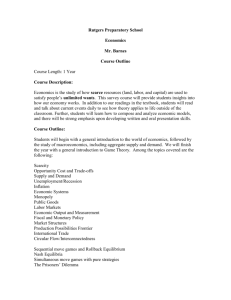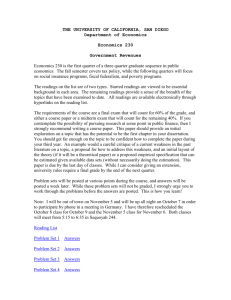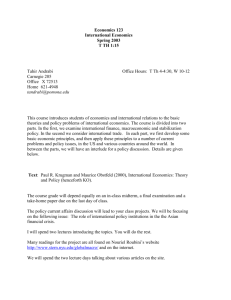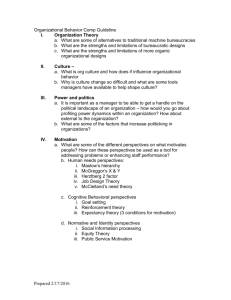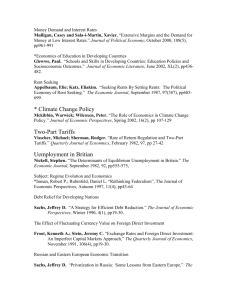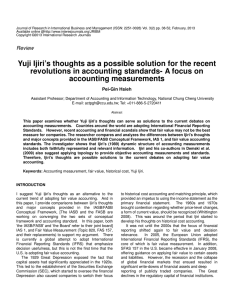Accounting Theory - Faculty, Student & Ph.D. Support
advertisement
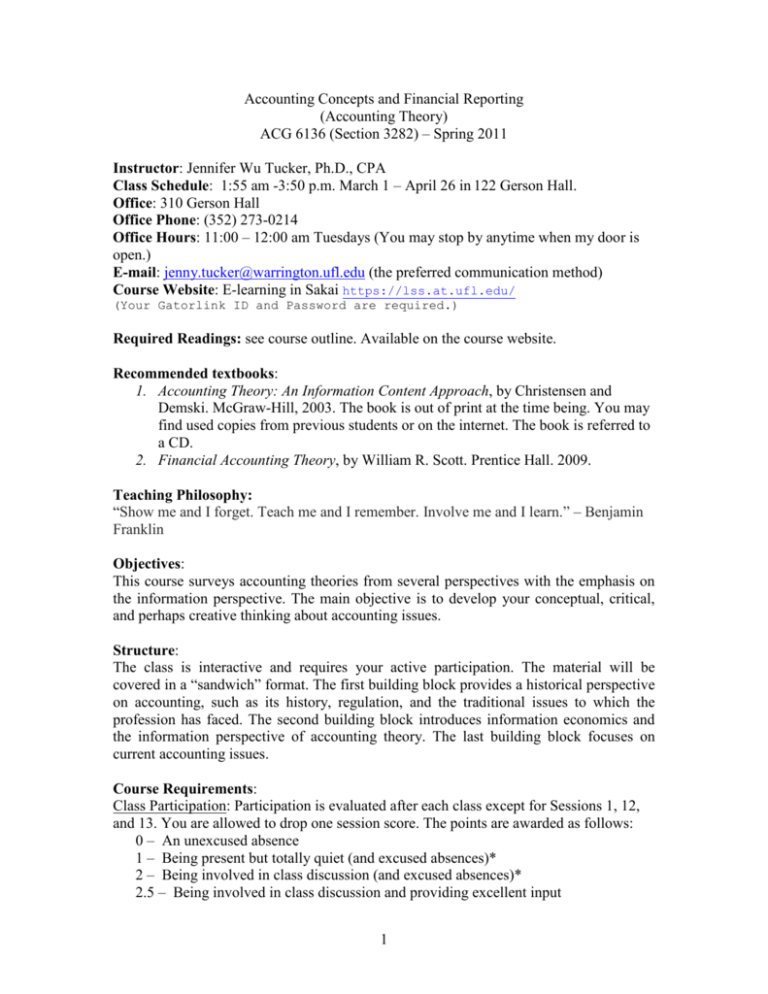
Accounting Concepts and Financial Reporting (Accounting Theory) ACG 6136 (Section 3282) – Spring 2011 Instructor: Jennifer Wu Tucker, Ph.D., CPA Class Schedule: 1:55 am -3:50 p.m. March 1 – April 26 in 122 Gerson Hall. Office: 310 Gerson Hall Office Phone: (352) 273-0214 Office Hours: 11:00 – 12:00 am Tuesdays (You may stop by anytime when my door is open.) E-mail: jenny.tucker@warrington.ufl.edu (the preferred communication method) Course Website: E-learning in Sakai https://lss.at.ufl.edu/ (Your Gatorlink ID and Password are required.) Required Readings: see course outline. Available on the course website. Recommended textbooks: 1. Accounting Theory: An Information Content Approach, by Christensen and Demski. McGraw-Hill, 2003. The book is out of print at the time being. You may find used copies from previous students or on the internet. The book is referred to a CD. 2. Financial Accounting Theory, by William R. Scott. Prentice Hall. 2009. Teaching Philosophy: “Show me and I forget. Teach me and I remember. Involve me and I learn.” – Benjamin Franklin Objectives: This course surveys accounting theories from several perspectives with the emphasis on the information perspective. The main objective is to develop your conceptual, critical, and perhaps creative thinking about accounting issues. Structure: The class is interactive and requires your active participation. The material will be covered in a “sandwich” format. The first building block provides a historical perspective on accounting, such as its history, regulation, and the traditional issues to which the profession has faced. The second building block introduces information economics and the information perspective of accounting theory. The last building block focuses on current accounting issues. Course Requirements: Class Participation: Participation is evaluated after each class except for Sessions 1, 12, and 13. You are allowed to drop one session score. The points are awarded as follows: 0 – An unexcused absence 1 – Being present but totally quiet (and excused absences)* 2 – Being involved in class discussion (and excused absences)* 2.5 – Being involved in class discussion and providing excellent input 1 Examples of excellent input are: - Ask good questions - Read and bring related articles that are not assigned by the instructor for class discussion - Volunteer to lead class discussion or demonstrate on the board. - Integrate real-life experience (e.g., your internship, working, or debate experiences) into class discussion. *: Within a week after you return from an excused absence, you must make an appointment with me to let me question you on the assigned readings for the class that you have just missed. Your participation grade will be assigned after this test. Readings: The class requires A LOT of reading. You are required to read the material assigned for each session before class and be prepared for class discussion. Please plan your time ahead because some readings are quite long. You are encouraged to read beyond what has been assigned. Homework: Five homework assignments will be collected. You must write up your answers individually, even though you may talk with your classmates during your preparation. Group Project: Please form a group of 3 to 4 members. Your group will be randomly assigned an accounting issue to investigate. The accounting issues are either “accounting for leases” or “accounting for revenue recognition.” You will research about the accounting issue and write a report of no more than five pages (singled-spaced, the page limit does not include the reference list and any figures or tables). A good starting point for both accounting issues is the recent exposure draft issued by FASB for public comments and comments on the proposed rule. You are encouraged to use additional sources. You must read widely, think creatively, reason logically, and write clearly. Your project grade will be based on my evaluations of the written report, presentation slides, and individual presentation. To discourage free-riding, at the end of the course each group member will turn in his or her peer evaluations (between 0 and 10) of the other group members. A student’s mean peer evaluation divided by 10 will be the grading weight used for his or her group-score portion of the project. Please e-mail me the list of your group members by March 16 and the project assignment will be drawn in class on March 17. The written report and presentation slides are due on April 19 before class by e-mail (one email per group, no hard copies, please). Final Exam: Two questions in the final exam will be on site. These questions are comparable to your homework problems. The other four questions will be take-home, essay-type. For the take-home questions, you may use all the resources you have except for asking people including your classmates. Grading: Class Participation Homework (5) Group Project Written Report (group) Presentation slides (group) Presentation (individual) 25 25 10 5 5 2 Final Exam On-site problems Take-home short essays Total 10 20 100 points Other Issues: 1. E-mail is the best way to reach me. In the “subject” section of your e-mail, please indicate your course number “ACG6136.” For questions that require long answers, please come to see me during my office hours or talk with me after class. 2. Grading issues should be raised within a week after the graded assignment is returned. 3. I change the required readings, homework assignments, group project, and final exam questions from year to year. Asking students who took my course previously for answers is not a good allocation of your time. 4. Religious holidays are valid excuses for your absence if you follow the procedures stated in University’s attendance policies. 5. Please come to class on time and turn off your electronic devices (including computer) before class. Required Readings (in the order of the dates assigned): 1: Gregory B. Waymire and Sudipta Basu (2008). Accounting is an evolved economic institution. Foundations and Trends® in Accounting: Vol. 2: No 1–2, pp. 1-174. 2: Ijiri, Y. 2005. U.S. accounting standards and their environment: A dualistic study of their 75 years of transition. Journal of Accounting and Public Policy 24: 255-279. 3: Hart, O. 2009. Regulation and Sarbanes-Oxley. Journal of Accounting Research 47 (2): 437-445. 4: Hanson, S. G., A. K. Kashyap, and J. C. Stein. 2011. A macroprudential approach to financial regulation. Journal of Economic Perspectives 25 (1): 49-70. 5: Backhouse, R. E. and S. G. Medema. 2009. Retrospectives: On the definition of economics. Journal of Economic Perspectives 23 (1): 221-233. 6: Ohanian, L. E. 2010. The economic crisis from a neoclassical perspective. Journal of Economic Perspectives 24 (4): 45-66. 7: Akerlof, G. A. The market for “lemons”: Quality uncertainty and the market mechanism. The Quarterly Journal of Economics. 1970. 8: Spence, M. Job market signaling. The Quarterly Journal of Economics. 1973. 9: Krugman, P. 9/6/2009. How did economists get it so wrong? The New York Times. 10: Brooks, D. 10/28/2008. The behavioral revolution. The New York Times. 11: J. Ohlson. 2009. Accounting data and value: Some results. Contemporary Accounting Research 26 (1): 231-259. 12: Watts, R. L. and J. L. Zimmerman. 1983. Agency problems, auditing, and the theory of the firm: Some evidence. Journal of Law and Economics 26 (3); 613-633. 3 13: Jensen, M.C. and W. H. Meckling. 1976. Theory of the firm: Managerial behavior, agency costs and ownership structure. Journal of Financial Economics 3: 305-360. 14: FASB proposed new rule: exposure draft on lease accounting. 15: AAA comments on the proposed lease accounting rule. 16: FASB proposed new rule: exposure draft on revenue recognition. 17: AAA comments on the proposed revenue recognition rule. Class Outline No 1 2 3 4 5 6 7 8 9 Date 3/1 (Tues) 3/3 (Thur) 3/15 (Tues) 3/17 (Thur) 3/22 (Tues) 3/24 3/29 (Tues) 3/39 (Thur) 4/5 (Tues) 4/7 (Thur) Topic Assignments Preliminaries History of Accounting (I) 1. Read before class: Waymire and Basu (2008, Ch. 3, pp.11-27 and Ch. 4, pp.28-55), Ijiri (2005) 2. HW1 due 3/15: 1-page (singlespaced) report -- list two controversial accounting standards and explain why they are controversial. Spring break History of Accounting (II) Review of economics Review of math and statistics Information economics No class (project time) Accounting for Valuation (I) (topics: valuation under certainty, value, income, depreciation, cost of capital) Critiques of traditional economics Accounting for Valuation (II) (topics: valuation under uncertainty, modeling information, the impact of information) Accounting for Valuation (III) (topics: residual-income valuation, accrual accounting) 4 Read before class: Hart (2009), Hanson et al. (2011) Read before class: Backhouse and Medema (2009), Ohanian (2010) HW2 due 3/22: 3-page (single-spaced) report on George A. Akerlof, A. Michael Spence, and Joseph E. Stiglitz. Read before class: Akerlof (1970) and Spence (1973) Instructor attends conference. Read before class: Waymire and Basu (2008, Ch. 6, pp.94-135) HW3 due 4/5 Recommended reading: CD Ch. 5&6 Read before class: Krugman (2009), Brooks (2008) Start to read: Ohlson (2009) Recommended reading: CD Ch. 7& 8 (up to p.153) Finish reading before class: Ohlson (2009) HW 4 due 4/12 10 4/12 (Tues) 11 4/14 (Thur) 12 4/19 (Tues) Current Issues: lease accounting (including group presentations) 13 4/21 (Thur) 4/26 (Tues) Current Issues: revenue recognition (including group presentations) Final exam (two exam questions to be finished on site and four exam questions are take-home essays to be turned in by e-mail by Friday (4/29) 14 Accounting for Evaluation (I) (topics: firm maximization problem, maximization with manager's effort observable) Accounting for Evaluation (II) (topics: maximization with manager's effort unobservable) Read before class: Watts and Zimmerman (1983) Recommended reading: CD Ch. 2&11 Read before class: Jensen and Meckling (1976) HW 5 due 4/19 Recommended reading: CD Ch. 12 FASB exposure draft on leases and AAA’s comments Group report due before class FASB exposure draft on revenue recognition and AAA’s comments Final exam at 2:00-3:50 in Gerson 122 Other readings that you may find interesting (alphabetical order): Ball, R. 1989. The firm as a specialist contracting intermediary: Application to accounting and auditing. Manuscript. Ball, R. 2009. Market and political/Regulatory perspectives on the recent accounting scandals. Journal of Accounting Research 47 (2): 277-323. Ball, R. 2006. International Financial Reporting Standards (IFRS): pros and cons for investors. Accounting and Business Research: 5-27. Carruthers, B. G. and W. N. Espeland. 1991. Accounting for rationality: Double-entry bookkeeping and the rhetoric of economic rationality. The American Journal of Sociology 97 (1): 31-69. Copeland, J. E. Ethics as an imperative. Accounting Horizons. 2005. Dye., R. A. and S. Sunder. 2001. Why not allow FASB and IASB standards to compete in the U.S.? Accounting Horizons 15 (3): 257-271. Glover, J.C., Y. Ijiri, C. B. Levine, and P. J. Liang. 2005. Separating facts from forecasts in financial statements. Accounting Horizons 19 (4): 267-282. Healy, P. M. and K. G. Palepu. 2003. The fall of Enron. Journal of Economic Perspectives 17 (2): 3-26. Hines, J. R. Jr. 2010. Treasure islands. Journal of Economic Perspectives 24 (4): 103126. Ijiri, Y. 1983. On the accountability-based conceptual framework of accounting. Journal of Accounting and Public Policy 2: 75-81. 5 Laux, C. and C. Leuz. 2010. Did fair-value accounting contribute to the financial crisis? Journal of Economic Perspectives 24 (1): 93-118. Mishkin, F. S. 2011. Over the cliff: from the subprime to the global financial crisis. Journal of Economic Perspectives 25 (1): 49-70. Mahoney, P. G. 2009. The development of securities law in the United States. Journal of Accounting Research 47 (2):325-347. North, D. C. 1991. Institutions. Journal of Economic Perspectives 5 (1); 97-112. Palmrose, Z. 2009. Science, politics, and accounting: A view from the Potomac. The Accounting Review 84 (2): 281-297. Ryan, S. G. Accounting in and for the subprime crisis. The Accounting Review. Forthcoming. 2008a. Stulz, R. M. 2010. Credit default swaps and the credit crisis. Journal of Economic Perspectives 24 (1): 73-92. Watts, R. L. and J. L. Zimmerman. The demand for and supply of accounting theory: The market for excuses. The Accounting Review. 1979. Waymire, G. B. 2009. Exchange guidance is the fundamental demand for accounting. The Accounting Review 84 (1): 53-62. Wyatt, A. R. 2004. Accounting professionalism – They just don’t get it! Accounting Horizons 18 (1): 45-53. Wyatt, A. 1990. Accounting standards: Conceptual or political? Accounting Horizons (September): 83-88. Wyatt, A. 1991. The SEC says: Mark to market! Accounting Horizons (March): 80-84. Zeff. S. A. 2005. The evolution of U.S. GAAP: The political forces behind professional standards. Parts 1 and 2. The CPA Journal. January 2005. Zeff, A. A. 2003. How the U.S. accounting profession got what it is today: Part I and Part II. Accounting Horizons. Zingales, L. 2009. The future of securities regulation. Journal of Accounting Research 47 (2): 391-425. 6


